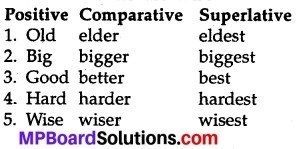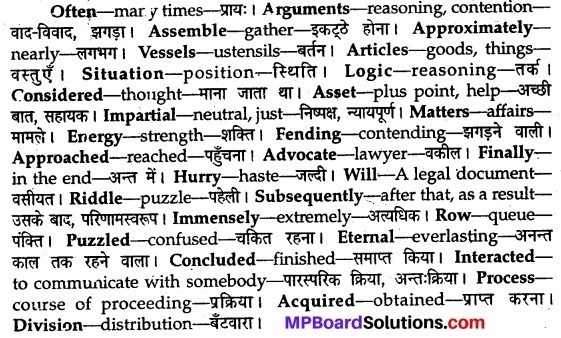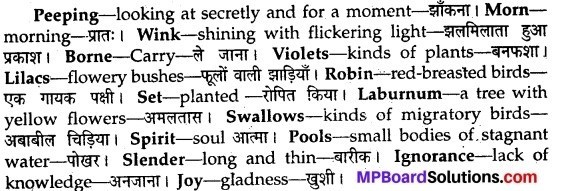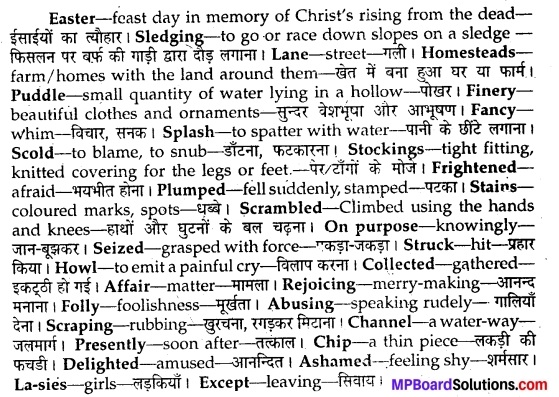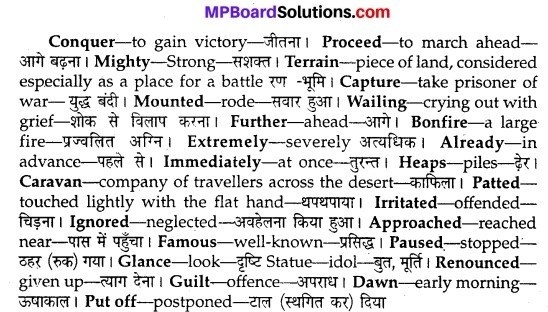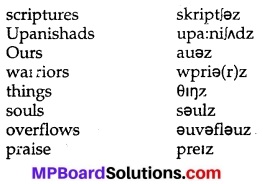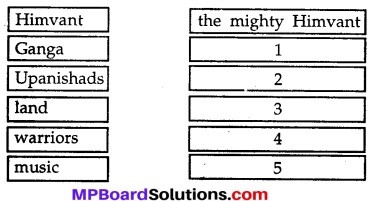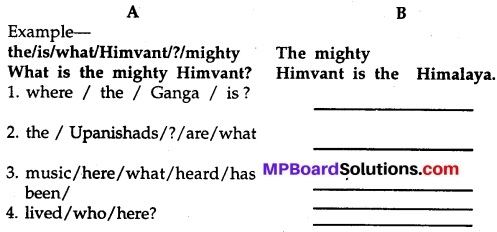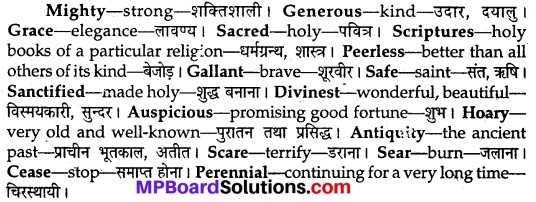MP Board Solutions for Class 9 English The Rainbow Solutions Chapter 6 Arise, Awake Questions and Answers aids you to prepare all topics in it effectively. You need not worry about accuracy of Madhya Pradesh State Board Solutions for Class 9 English Chapter 6 Arise, Awake as they are given adhering to the latest exam pattern and syllabus guidelines. You Can Download MP Board Class 9 English Solutions Questions and Answers, Notes, Summary, Guide pdf on is page. Enhance your subject knowledge by preparing from Chapterwise MP Board Solutions for Class 9 English and clarify your doubts on corresponding topics.
MP Board Class 9th English The Rainbow Solutions Chapter 6 Arise, Awake
Kick start your preparation by using our online resource Madhya Pradesh State Board Solutions for Class 9 English The Rainbow Solutions Chapter 6 Arise, Awake. You can even download MP Board Solutions for Class 9 English free of cost rough direct links available on our page. Clear your queries and understand concept behind in a simple manner. Simply tap on concept you wish to prepare chapterwise and go rough it.
Arise, Awake Textual Exercises
Arise, Awake Vocabulary
A. Match the following.
1. tat – (a) very small child
2. taught – (b) something of very low quality
3. taut – (c) to carry especially with difficulty
4. tot – (d) showing signs of worry or anxiety
5. tote – (e) pass on knowledge or skill
6. tut – (f) care or responsibility
7. trust – (g) used for expressing slight disapproval or annoyance.
Answer:
1. (b), 2. (e), 3. (d), 4. (a), 5. (c), 6. (g), 7. (f).
B. Write ‘in’, ‘im’ or ‘un’ before the following words!
1. domitable
2. complete
3. able
4. avoidable
5. eligible
6. leash
7. bearable
8. audible
9. auspicious
10. correct
11. sincere
12. polite
Answer:
- Indomitable
- Incomplete
- Unable
- Unavoidable
- Ineligible
- Unleash
- Unbearable
- Inaudible
- Inauspicious
- Incorrect
- Insincere
- Impolite.
C. Choose the correct word and fill in the blanks. ,
(i) Children in school are expected to ……………. (collect/assimilate/take) what they have been taught.
(ii) Do not search for God in ……………….. (vague, clear, obscure) places.
(iii) This latest outbreak of violence is a clear ……………… (manifestation,feeling/ belief) of the growing discontent in the area.
(iv) Do not………………. (aspire, expire, ceasefire) to have wanted things in your life.
(v) Our country needs …………. (wide, large, tremendous) sacrifice.
Answer:
(i) assimilate
(ii) obscure
(iii) manifestation
(iv) aspire
(v) tremendous.
D. In words like ‘arise’ and ‘awake’ stress is not on the first syllable. Give some more examples of the words beginning with ‘a’ and having stress on the second syllable.Example : again
Answer:
Some words beginning with ‘a’ and having stress on second syllable.aboard (e’bo:d); about (a’baut); above (a’bAv); abrupt (a’brApt); abuse (a’bju=z), accent (ak’sent); accept (ak’sept); account (ak’aunt); across (ak’ros); adjust (e’djAst); admire (a’dmai3); admit (ad’mit)
Comprehession
A. Answer each of the following questions in about 25 words.
1. What does Swami Vivekananda say about the importance of strength?
2. What is the biggest enemy of strength? Why?
3. What good qualities should the youth of our country acquire?
4. What is real worship?
5. How can we make our nation prosper?
Answer:
1. Swami Vivekananda says that every page of the Upanishads speaks about strength. Strength is a great thing to be remembered or to be taught. Strength means fearlessness. Strength is the most important and most wanted thing. Our Upanishads are the great mine of strength.
2.’Fear’ is the biggest enemy of ‘strength’. Fear is the great cause of misery in the world. The fearful have no position or entity. Fear is the greatest of all superstitions. Fear is the cause of our woes. It makes us physically and mentally weak and poor.
3. The youth of our country should acquire the quality of service, helpfulness, dutifulness and gratitude. They should be humble teachers, trainers and guides of illiterate and ignorant masses. They should serve as errand boys without being proud. They should be heroic, knowledgeable and self-reliant.
4. Prayer for the uplift of the poor, illiterate and down-trodden people is true worship of God. We should bring light in their life. We should heed to the needs of the hungry and the ignorant. We should treat the poor as our God. We should serve mankind. This is real worship of God.
5. We should educate and raise the masses. We should strive for the manifestation of the perfect already in man. We should inspire the spirit of service to man among the masses. We should help the illiterate and ignorant people in building their character. Thus we can make our nation progress.
B. Answer each of the following questions in about 50 words.
1. What according to Swami Vivekananda is real education?
2. Why do you agree that the ideas of the author are universal?
3. Discuss the need and importance of mass education.
Answer:
1. According to Swami Vivekananda, education is the manifestation of the perfection already in man- He does not think such education as education which makes man a machine. The job of education is to produce original men. Real education inculcates in man the qualities of service to humanity. It also enables one to build one’s life and character. Moreover, it makes .one strong, self- reliant and self-supporting. One becomes the shaper and sharpener of one’s destiny.
2. Swami Vivekananda has thrown light on many ideas in this lesson. He stresses the need of being strong. He has asked the people to arise and awake. Only those people can make a sacrifice for the nation who are young, energetic, strong, well-built and intellectual. Don’t consider yourself poor or without friends. Fear or superstition brings misery and woes. The youth should spread the message of courage across the country. They should make the people struggle for their existence and prove themselves the shapers of their destiny. They should develop faith and become self-reliant. They should lovingly aspire to serve the masses and educate and raise them. They should worship God through service to man. All these ideas are universal.
3. Need and Importance of Mass Education : Education was not available to the common people during the times of Swami Vivekananda. It was confined to the haves only. The poor, the miserable and the down¬trodden remained backward, illiterate and ignorant. No nation can be called advanced if her masses are uneducated. Such people used to staive and die of hunger. Swami Vivekananda felt the need of education to improve their condition. It was the only way to achieve any improvement in individual as well as in society.
Arise, Awake Grammar
A. Study these sentences.
- Upanishads speak to me from every page-stand up and be strong.
- What we need is strength, who will give us strength?
- Arise, awake and stop not till the desired end is reached.
- Help me. Go out in the world, to the villages.
- Spread this message to the humblest and to the mightiest. There is no obvious future tense in English corresponding to the time/tense relation for present and past. Instead there are several possibilities for denoting future time.
Pick out the sentences occurred in the text showing Future Time references.
The following sentences show Future Time references.
This is the one great thing to remember (that we shall remember)….as one that lives and dies with you. (as one that will live and die with you. stop not (you will stop not) till the desired end is reached). your country needs (will need) this tremendous sacrifice. It is the young men hat will do it.
The moment you fie (will fear) you are nobody.
It is fearlessness that rings (will bring) heaven even in a moment. Who will bring light to them. He who loves (will love) creation is serving (will serve) God.
Speaking Activity
A. Following are the excerpts from the speech of Swami Vivekananda. Learn a few of them and speak them in the manner Swamiji might have spoken.
- Strength, strength what the Upanishads speak to me from every page.
- O man, be not weak. Stand up and be strong.
- Arise, awake and stop not till the desired end is reached.
- Be bold and fear not. Arise! Awake for your country needs this tremendous sacrifice.
- Think not that you are poor, that you have no friends. The moment you fear you are nobody. It is fear that is the great cause of misery in the world. It is fear that is the cause of our woes and it is fearlessness that brings heaven even in a moment.
Answer:
In every page, the Upanishads speak about the importance of strength.
Leave your weakness, stand up and be strong.
Arise and awake and go on struggling till you achieve your goal.
The country needs bold and fearless young people.
Fear, brings misery and woes. Fearlessness brings heavenly atmosphere instantly.
B. Quote orally some sayings of the other Indian philosophers and social reformers like Mahatma Gandhi, Maharishi Aurobindo, Dr. Radhakrishnan, Swami Dayananda and others.
Answer:
For self attempt
Writing Activity
A. What qualities would you like to imbibe after reading the speech. Write to your younger brother about them. (50 words)
Answer:
67/2 (Block C-19)
S.P.M. Park.
New Delhi-18
21st June, 2007
Dear Nikunj
I have read the lesson ‘Arise, Awake!’ written by Swami Vivekananda. It is a highly instructive lesson. I would like to imbue the qualities of strength, fearlessness, helpfulness, fellow feeling, character and career-building. I shall feel grateful to my society and serve the masses. I shall treat the poor as God. I hope you will also imbibe these qualities. Rest when we meet.
Yours sincerely,
Mukul Sharma.
B. If you were a reporter of a newspaper present at the time of Swami Vivekanand’s speech given in the text, what report along with a headline would you have written? (150 words)
Answer:
New Delhi : 21st June, 2007
By Staff Correspondent
Message of Courage -Nikunj Sharma
Swami Vivekananda delivered an invigorating speech in Ram Lila Ground yesterday. The report of the same is as under: Never forget the message of acquiring strength. It is the moral of the Upanishads. Fearlessness is a great virtue. It brings heaven even in a moment. Young men should try to be energetic, strong, well-built and intellectual. It is the call of the world that the young people should arise and awake, struggle and make sacrifices for the suffering humanity. They should forsake superstitions and fears. Fear brings about misery and woes. They should go across the country and spread the message of courage.
Arise, Awake Think it over
A. To be a citizen of a strong nation is a great feeling. What are the things that make a nation strong? Is it only army that makes a nation strong? Or is it only national character that makes a nation strong? Why?
B. Fear is the greatest of all superstitions because fear is often based on false ideas. One should always be fearless to venture into unknown. Is it true?
C. Education is the continual refinement of human instincts and behaviour.
Education builds national character. The national character decides the direction in which the nation progresses. How important is character in your view?
D. Service to mankind means service to God. The poor is our God in million forms. What is your opinion?
Answers:
A. It is a matter of pride to be a citizen of a strong nation. Citizens are the pillars of a nation. They make a nation strong. Army alone cannot make a nation strong. National character plays a vital role in making a nation strong. India is a country of vast diversities. Only men of character can maintain internal peace and promote national unity. They alone can eradicate economic, social and religious disparities. National character alone can bring about national integration.
B. Fear is the greatest of all superstitions. If somebody sneezes when you start a journey or a cat crosses your path or a widow comes on your way or an empty pot comes into sight, you drop your journey. You fear that something evil would take place. Fear is based on false assumptions. Those who are not superstitious never suffer. It is true that we should be fearless to venture into unknown. The fearful alone are losers. Courage is the initial step to success.
C. Character is more, important that coins. A man of character is a fearless person. He is like a tiger who never bows down to the pressure of an army of jackals. Character refers to all the manual or moral qualities that make a person, group, nation etc. different from others. Character is the sum total of courage, sincerity, obedience, usefulness and truthfulness. A man of character is ever vigilant, per-severing and dedicated. He is energetic and intellectual. A man of character is honoured everywhere.
D. India is a rich land inhabited by the poor. Ninety percent of Indian population consists of have-nots. They lack food, clothing and shelter. Their children are forced to remain illiterate and labourers throughout life. Their service is the service of God, Abou Ben Adham’s name was put on the top of the list of those who love God. It is because he loved mankind. If we educate a single poor fellow, we shall do the best service to God. God lives in huts. Praying to God in the temple and hating his real sons is a sin. If we feed the hungry and clothe the poor, God will bless us.
Thinks to do
Visit your library and collect information regarding the life of Swami Vivekananda on the following points :
- birth
- childhood
- education
- fame
- message to the Indian youth.
Answer:
Life of Swami Vivekananda Swami Vivekananda was born in 1883 in a Kshatriya family in Calcutta. His real name was Narendra Nath Dutta. He was initiated into religious ceremonies from his early childhood. He developed a keen eagerness for the study of religious scriptures. He studied Indian philosophical traditions arid western literature and philosophy. He was an intelligent and gifted student. He was a firm believer in the philosophy of Vedant and Upanishad. He had done graduation. He believed that only study of books is not education. He became the pupil of Swami Rama Krishnan. There he was called Vivekananda. He founded the Rama Krishna Mission. He became famous due to his power of speech, music and delivering of sermons. His speech in Chicago made him a saint of world wide fame. He advised the Indian youth to spread the message of courage throughout the country and to guide the ignorant and illiterate masses.
Arise, Awake Additional Questions
Short Answer Questions (in about 25 words)
Question 1.
What did Jawaharlal Nehru say about Vivekananda?
Answer:
Though Vivekananda was rooted in the past, he was also full of pride in India’s prestige. Even then, he was modern in his approach of life’s problems. He was a kind of bridge between the past of India and her present. The service of mankind through social service, mass education, religious revival and social awakening through education was Vivekananda’s mission.
Question 2.
Give the life sketch of Swami Vivekananda in brief.
Answer:
Swami Vivekananda was born in 1883 in a Kshatriya family in Calcutta. His real name was Narendra Nath Dutta. His father Shri Vishnu Nath Dutta was an advocate at Calcutta High Court. His. grand father, Shri Durga Charan Dutta was a talented person. Vivekananda inherited many qualities from his grandfather. His father urged him to read music. His mother was also a woman of virtues.
Question 3.
What was Vivekananda’s philosophy of life?
Answer:
Swami Vivekananda thought that human life was a constant struggle. Only the strong were able to exist and live. The defeated ones decayed and died out. Every individual should make himself ready to face all the challenges boldly and confidently. He felt pity for the poor and weak people who lived in fear. According to him, a coward, sad and indifferent person can do nothing in his life. Only the brave can uplift the world.
Question 4.
What according to Vivekananda should be the aims of education?
Answer:
The prime aim of education according to Vivekananda is to achieve fullness of perfection already present in a child. It should enable the child to promote national growth and advancement as a fearless and well-developed citizen of tomorrow. The greatness of citizens is possible only through their moral and spiritual development. Education should foster it. Character development is an important aim of any education. Education should develop faith in one’s own self. The people should be enabled to realise unity in diversity and find the absolute truth or reality.
Long-Answer Type Question (in about 150 words)
Question 1.
What are the basic principles of Vivekananda’s Philosophy of Education?
Answer:
The following are the basic principles of Vivekananda’s philosophy of education :
Mere study of books cannot be called education. Man uncovers and develops the knowledge lying already hidden in his mind. Practice of Brahmcharya is essential for concentration, which is key to all knowledge. Self-discipline means purity of thought, speech and deed. Education should bring out all round development of the child. It should foster spiritual faith, devotion and self surrender in the individual. It should develop one’s character and inculate self-reliance. Same mass education should be formulated and launched for both sexes. Teacher should be treated as a friend, philosopher and guide. Technical education should lead to economic prosperity of the nation.
Arise, Awake Summary in English
Strength is a great thing. It is the gist of the Upanishads. The word ‘Abhih’ has often been used in our Upanishads. Swami Vivekananda says” that die Indians need strength. The Upanishads ‘ are die great mine of strength. The Swami asks the people to arise and awake and continue working till the desired end is reached. The country needs this sacrifice. The world calls us to arise and awake. Fear is a superstitious. It is cause of all woes and ‘miseries. Fearlessness brings heaven instantly.
The Swami calls the youth of India to help him in spreading the message of courage. They should inspire the people to unleash their creative energies to shape their destiny. They should teach the people to have faith and be self-reliant. Masses should be educated and raised. Education is the manifestation of die perfection already in man. It is the assimilation of ideas which makes one’s life and character. An original man of integrity is the real man.
The young men should love the poor and ignorant and pray for the down-trodden. The poor is our God and the illiterate is our master. Love of the poor is the service of God.
Arise, Awake Summary in Hindi
शक्ति (बल, पुष्टता), एक महान चीज़ है। यह उपनिषदों का सार है। ‘अभय’ शब्द का हमारे उपनिषदों में बहुधा प्रयोग हुआ है। स्वामी विवेकानन्द कहते हैं कि भारतीयों को शक्ति की आवश्यकता है। उपनिषद शक्ति के महान भण्डार (स्रोत/खान) हैं। स्वामी, लोगों से कहते हैं कि उठो तथा जागो और तब तक काम करते रहो जब तक आपका वाञ्छित लक्ष्य प्राप्त नहीं हो। देश को इस बलिदान की आवश्यकता है। संसार, हमें उठने और जागने के लिए पुकार रहा है। भय, एक अंधविश्वास है। यह सभी संतापों और दुःखों का कारण है। निडरता, तत्काल स्वर्ग को लाती है।
स्वामी, भारत के नवयुवकों को पुकारते हैं कि साहस का संदेश फैलाने में उनकी सहायता करें। अपने प्रारब्ध को बनाने के लिए अपनी सृजनात्मक शक्तियों को उजागर करने के लिए, उन्हें लोगों को प्रेरणा देनी चाहिए। उन्हें विश्वास रखने तथा आत्म-निर्भर बनने के लिए, लोगों को शिक्षा देनी चाहिए। जनसमूह को शिक्षित किया जाना चाहिए तथा उनका उत्थान किया जाना चाहिए, मनुष्य के अन्दर पहले से उपस्थित पूर्णता का प्रत्यक्षीकरण ही शिक्षा है। विचारों को आत्मसात् करने से ही मानव के निजी जीवन तथा चरित्र का निर्माण होता है। – नवयुवकों को निर्धनों तथा अज्ञानियों से प्रेम करना चाहिए और पद-दलितों के लिए प्रार्थना करनी चाहिए, निर्धन व्यक्ति हमारा भगवान है और अशिक्षित हमारा स्वामी है। निर्धनों के प्रति प्रेम रखना ही भगवान की सेवा है।
Arise, Awake Word-Meaning

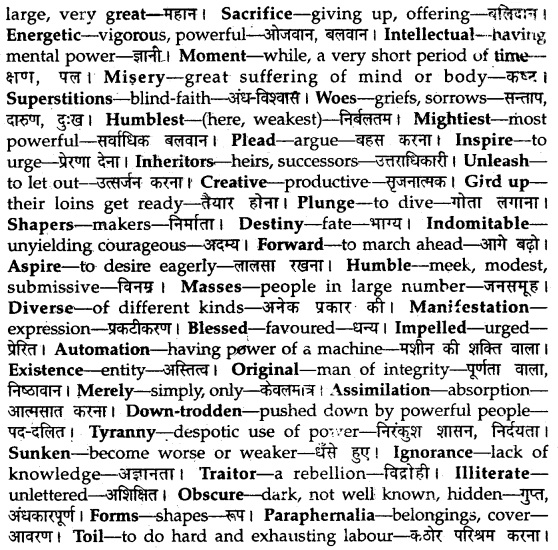
We believe the information shared regarding MP Board Solutions for Class 9 English The Rainbow Solutions Chapter 6 Arise, Awake Questions and Answers as far as our knowledge is concerned is true and reliable. In case of any queries or suggestions do leave us your feedback and our team will guide you at soonest possibility. Bookmark our site to avail latest updates on several state board Solutions at your fingertips.

